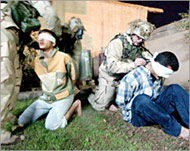Rights group: Iraq invasion not justified
The war in Iraq ended a brutal regime but there were no ongoing human rights violations on a scale which could justify the US-led invasion, Human Rights Watch said in its annual report.

Although Saddam Hussein had an atrocious human rights record, his worst actions occurred long before the war and there was no ongoing or imminent mass killing in Iraq when the conflict began, the advocacy group said.
US President George Bush and British Prime Minister Tony Blair cited the threat from Saddam’s alleged weapons of mass destruction as their main reason for attacking Iraq.
But as US-led occupation forces have failed to find evidence of such weapons, both leaders have also highlighted the brutality of the regime when justifying military intervention.
Human Rights Watch, however, said such claims were invalid.
“The Bush administration cannot justify the war in Iraq as a humanitarian intervention, and neither can Tony Blair,” executive director Kenneth Roth said.
Atrocities such as Saddam’s 1988 mass killing of Kurds would have justified humanitarian intervention, Roth said.
“But such interventions should be reserved for stopping an imminent or ongoing slaughter,” he added. “They shouldn’t be used belatedly to address atrocities that were ignored in the past.”
Roth said, however, the toppling of Saddam had improved conditions for Iraqis.
Security situation
“For the moment I would say that Iraq is better off, but (that) alone doesn’t justify an intervention of a humanitarian kind,” he told a news conference. He expressed fears that the security situation could deteriorate, leading to chaos and civil war that would leave Iraqis worse off than before.
 |
|
US is using ‘war rules’ in fight |
The 407-page Human Rights Watch World Report 2004 also said the US government was applying “war rules” to the struggle against global terrorism and denying so-called terror suspects their rights.
It suggested that “police rules” of law enforcement should be applied in such cases instead.
“In times of war you can detain someone summarily until the end of the war and you can shoot to kill. And those are two powers that the Bush administration wants to have globally,” Roth said. “I think that’s very dangerous.”
Detention without charge
The New York-based group strongly criticised the indefinite detention without charge of 660 people, declared to be “enemy combatants” by the American government, at a US naval base in Guantanamo Bay, Cuba.
Most of the detainees were seized in Afghanistan, but at least six, according to Amnesty International, were whisked to Cuba from other countries.
|
“The administration’s actions display a perilous belief that, in the fight against terrorism, the executive is above the law” Human Rights Watch report |
“The administration’s actions display a perilous belief that, in the fight against terrorism, the executive is above the law,” the report said.
US government officials have said the lengthy detentions are vital to intelligence-gathering and that the information gleaned from prisoners has led to arrests around the world.
Guantanamo
The Supreme Court has agreed to decide whether those held at Guantanamo should be given access to lawyers and courts. A decision is expected by July.
Human Rights Watch was critical of other countries in its report. It said European and other governments were ignoring human rights abuses in the conflict in Chechnya, which Russia characterises as its contribution to the so-called global war on terror.
The annual survey, which was being launched in Britain for the first time, featured 15 essays related to war and human rights including one that argues that allied forces in Afghanistan are “losing the peace” as brutal regional commanders gain control in the vast countryside outside the capital Kabul.